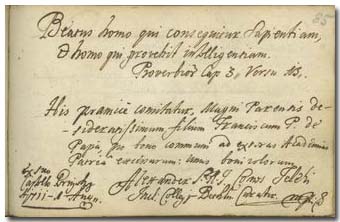
Beatus homo qui consequitur sapientiam,
& homo qui provehit intelligentiam. *
Proverbiorum Cap. 3. Versu 13.
His peramicem comitatur, Magni Parentis
desideratissimum filium Franciscum P. de Papa, pro bono communi ad
exteras Academias Patriâ excessurum: unus boni votorum.
ex suo
Castello Gernyeszeg
A 1711-1 Aug.
Alexander S. R. I. Comes Teleki
Incl: Collegij Bethlen. Curator. mpr.
|
* Prov 3:13. In the Vulgate: “Beatus homo qui invenit sapientiam et qui affluit prudentia.”
|
|
|
Happy is the man who findeth wisdom, and the man that getteth
understanding. *
Let this memento accompany my good friend, the
beloved son of his great father, Ferenc Páriz Pápai, who in the
interest of the common good sets out to foreign academies;
together with all my best wishes.
In my castle of Gernyeszeg
on August 1, 1711.
Count Sándor Teleki
Curator of the noble Bethlen College
|
p. 85. Gernyeszeg/Gorneşti, August 1, 1711
Teleki, Sándor
(1679-1754), Councillor of the
Transylvanian Government, patron of arts
Count Sándor Teleki of Szék was born in 1679 a son
of Mihály Teleki (1634-1690) and Judit Veér (1631-1707). He was
the father of Count Sámuel Teleki (1739-1822) founder of the
renowned Bibliotheca of Marosvásárhely (Târgu Mureş). After the
imperial troops in 1704 and 1707 looted Nagyenyed (Aiud) and
destroyed the famous Bethlen College and its library, he obtained
a royal patent for collecting funds in England for the rebuilding
of the college. Together with Ferenc Pápai Páriz Sen., he did much
for the college, of which he became Curator. Between 1711 and 1750
he supported some 30 students on foreign stipends. From 1734 until
his death he was supreme curator of the college of Marosvásárhely.
In 1733 he became Councillor of the Transylvanian Government, in
1736 Councillor of the Court Chancellary of Transylvania, and
later Lord Lieutenant of Torda county. In 1703 he married Júlia
Bethlen of Bethlen (1686-1722), daughter of Miklós Bethlen
(1642-1716). His second wife was Zsuzsanna Nagy of Petk (?-1748).
Count Sándor Teleki was known as a severe and autocratic
personality by his contemporaries. His youngest son Sámuel, who
had lost his mother at an early age, was educated with great care
by himself in his castle of Celna (Þelna). At the age of fifteen,
on September 5, 1754, Sámuel lost also his father, who in his last
months went to live to Gyulafehérvár (Alba Iulia), out of fear
from an armed robbery against his castle.
Count Teleki notes in the Album as Curator of the Bethlen College
of Nagyenyed. His two brothers, László and Pál had also made their
mementos in the Album in their castle of Gernyeszeg (Gorneşti) of
Maros-Torda county, on July 24 and 26, respectively (pp.
73,
83). The dating of the note of Sámuel
Teleki is perhaps erroneous, for on July 30 the two students,
János and Mihály Teleki, as well as their tutor András Ajtai Szabó
made their notes already in Kolozsvár (Cluj) (pp.
86,
87, 451).
The date of death of Count Teleki is sometimes given erroneously.
His son Sámuel has himself noted in his own beloved Bible: “My
dear Father died in the Castle of Karlsburg [=Gyulafehérvár] Ao.
1754. d. 5-a Sept.” [Deé Nagy 14]. It is also unfounded that the
renowned man of letters Péter Bod would have recommended in 1766
his Magyar Athenas to Count Teleki (who had been dead since
more than a decade). His recommendation was in fact to the three
young Counts of the next generation: Sámuel (1739-1822), son of Sándor, József
(1738-1796), grandson of Sándor and Ádám (1740-1792),
grandson of Pál [Bod, Teleki].
• Deé
Nagy • Gudenus • Nagy Iván XI 88 • Pallas • Peregrinus |

